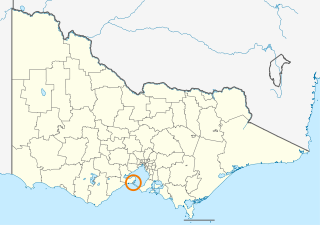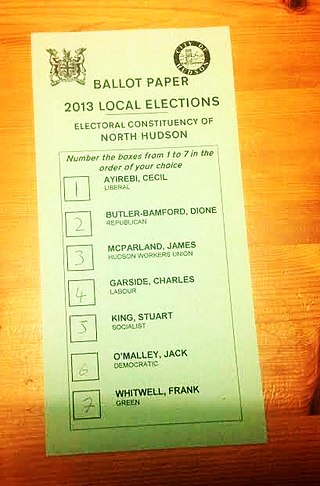The electoral system of Australia comprises the laws and processes used for the election of members of the Australian Parliament and is governed primarily by the Commonwealth Electoral Act 1918. The system presently has a number of distinctive features including compulsory enrolment; compulsory voting; majority-preferential instant-runoff voting in single-member seats to elect the lower house, the House of Representatives; and the use of the single transferable vote proportional representation system to elect the upper house, the Senate.
Electoral systems of the Australian states and territories are broadly similar to the electoral system used in federal elections in Australia.

The Borough of Queenscliffe is a local government area in the Barwon South West region of Victoria, Australia, located in the southern part of the state. It is the smallest local government area in Victoria, covering an area of 10.83 square kilometres (4.18 sq mi) and, in June 2018, had a population of 2,982. It includes only two settlements, which are Queenscliff and Point Lonsdale. It is situated on the south coast, south-east of Geelong on the Bellarine Peninsula south of Swan Bay and next to the Port Phillip Heads, the entrance to Port Phillip Bay from Bass Strait.

The Australian Electoral Commission (AEC) is the independent statutory authority and agency of the Australian Government responsible for the management of federal Australian elections, by-elections and referendums.
Elections in Australia take place periodically to elect the legislature of the Commonwealth of Australia, as well as for each Australian state and territory and for local government councils. Elections in all jurisdictions follow similar principles, although there are minor variations between them. The elections for the Australian Parliament are held under the federal electoral system, which is uniform throughout the country, and the elections for state and territory Parliaments are held under the electoral system of each state and territory.

In Australia, electoral districts for the Australian House of Representatives are called divisions or more commonly referred to as electorates or seats. There are currently 151 single-member electorates for the Australian House of Representatives.

The Parliament of Victoria is the bicameral legislature of the Australian state of Victoria that follows a Westminster-derived parliamentary system. It consists of the King, represented by the Governor of Victoria, the Legislative Assembly and the Legislative Council. It has a fused executive drawn from members of both chambers. The parliament meets at Parliament House in the state capital Melbourne. The current Parliament was elected on 26 November 2022, sworn in on 20 December 2022 and is the 60th parliament in Victoria.
An electoral roll is a compilation that lists persons who are entitled to vote for particular elections in a particular jurisdiction. The list is usually broken down by electoral districts, and is primarily prepared to assist election officials at polling places. Most jurisdictions maintain permanent electoral rolls, which are updated continuously or periodically, while some jurisdictions compile new electoral rolls before each election. Electoral rolls are the result of a process of voter registration. In most jurisdictions, voter registration is a prerequisite for voting at an election. Some jurisdictions do not require voter registration, and do not use electoral rolls, such as the state of North Dakota in the United States. In those jurisdictions a voter must provide identification and proof of entitlement to vote before being permitted to vote.

In electoral systems which use ranked voting, a donkey vote is a cast ballot where the voter ranks the candidates based on the order they appear on the ballot itself. The voter that votes in this manner is referred to as a donkey voter.

The Commonwealth Franchise Act 1902(Cth) was an Act of the Parliament of Australia which set out who was entitled to vote in Australian federal elections. The Act established, in time for the 1903 Australian federal election, suffrage for federal elections for those who were British subjects over 21 years of age who had lived in Australia for six months. The Act excluded natives of Australia, Asia, Africa and the Pacific Islands (other than New Zealand) from the federal franchise, unless they were already enrolled to vote in an Australian state. The Act gave Australian women the right to vote and stand for parliament at the federal level unless they fell into one of the categories of people excluded from the franchise.

The Libertarian Party, formerly known as the Liberal Democratic Party (LDP), is an Australian political party founded in Canberra in 2001. The party espouses smaller government and supports policies that are based on classical liberal, libertarian principles, such as lower taxes, opposing restrictions on civil liberties, decentralisation, utilising nuclear energy, and the relaxation of smoking laws.

The Commonwealth Electoral Act 1918 is an Act of the Australian Parliament which continues to be the core legislation governing the conduct of elections in Australia, having been amended on numerous occasions since 1918. The Act was introduced by the Nationalist Party of Billy Hughes, the main purpose of which was to replace first-past-the-post voting with instant-runoff voting for the House of Representatives and the Senate. The Labor Party opposed the introduction of preferential voting. The Act has been amended on several occasions since.

Referendums are held only occasionally by the Government of New Zealand. Referendums may be government-initiated or held in accordance with the Electoral Act 1993 or the Citizens Initiated Referenda Act 1993. Nineteen referendums have been held so far. Fourteen were government-led, and five were indicative citizen initiatives.
In Australia, a redistribution is the process of redrawing the boundaries of electoral divisions for the House of Representatives arising from changes in population and changes in the number of representatives. There is no redistribution for the Senate as each State constitutes a division, though with multiple members. The Australian Electoral Commission (AEC), an independent statutory authority, oversees the apportionment and redistribution process for federal divisions, taking into account a number of factors. Politicians, political parties and the public may make submissions to the AEC on proposed new boundaries, but any interference with their deliberations is considered a serious offence.

The Court of Disputed Returns in Australia is a special jurisdiction of the High Court of Australia. The High Court, sitting as the Court of Disputed Returns, hears challenges regarding the validity of federal elections. The jurisdiction is twofold: (1) on a petition to the Court by an individual with a relevant interest or by the Australian Electoral Commission, or (2) on a reference by either house of the Commonwealth Parliament. This jurisdiction was initially established by Part XVI of the Commonwealth Electoral Act 1902 and is now contained in Part XXII of the Commonwealth Electoral Act 1918. Challenges regarding the validity of State elections are heard by the Supreme Court of that State as the State's Court of Disputed Returns.

The 2010 Victorian state election, held on Saturday, 27 November 2010, was for the 57th Parliament of Victoria. The election was to elect all 88 members of the Legislative Assembly and all 40 members of the Legislative Council. The incumbent centre-left Labor Party government, led by John Brumby, was defeated by the centre-right Liberal/National Coalition opposition, led by Ted Baillieu. The election gave the Coalition a one-seat majority in both houses of parliament.
Suffrage in Australia is the voting rights in the Commonwealth of Australia, its six component states and territories, and local governments. The colonies of Australia began to grant universal male suffrage from 1856, with women's suffrage following between the 1890s and 1900s. Some jurisdictions introduced racial restrictions on voting from 1885. Such restrictions had been eradicated by the 1960s. Today, the right to vote at all levels of government is held by citizens of Australia over the age of 18 years.
In Australia, voter registration is called enrolment. Enrolment is a prerequisite for voting at federal elections, by-elections and referendums, as well as all state and local government elections; and it is generally compulsory for enrolled persons to vote unless otherwise exempted or excused. Enrolment is compulsory for Australian citizens over 18 years of age who have lived at their current address for at least one month. Enrolment is not compulsory for persons with no fixed address who are not already enrolled. Residents in Australia who had been enrolled as British subjects on 25 January 1984, though not Australian citizens, continue to be enrolled, and cannot opt out of enrolment. For local government elections, an elector generally does not require to be an Australian citizen. Once enrolled, a person cannot opt out of enrolment. Enrolment is optional for 16- or 17-year-olds, but they cannot vote until they turn 18, and persons who have applied for Australian citizenship may also apply for provisional enrolment which takes effect on the granting of citizenship.
A referendum concerning the closing hour for licensed premises and registered clubs was put to voters on 15 February 1947. The referendum was conducted on the basis of optional preferential voting. Preferences were not counted as a majority voted to maintain the 6:00 pm closing time.

The 2026 Victorian state election is expected to be held on 28 November 2026 to elect the 61st Parliament of Victoria. All 88 seats in the Legislative Assembly and all 40 seats in the Legislative Council will be up for election, presuming there are no new electorates added in a redistribution.










